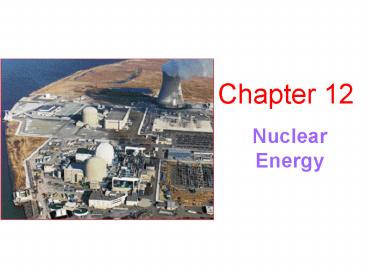Nuclear Energy - PowerPoint PPT Presentation
1 / 28
Title:
Nuclear Energy
Description:
nuclear energy released when atoms fused. Introduction to the Nuclear Process ... flatbed trucks. deliver waste. containers daily. Barrels are stacked. and surrounded ... – PowerPoint PPT presentation
Number of Views:48
Avg rating:3.0/5.0
Title: Nuclear Energy
1
Nuclear Energy
Chapter 12
2
Introduction to the Nuclear Process
- Fission
- nuclear energy released when atom split
- Fusion
- nuclear energy released when atoms fused
3
Introduction to the Nuclear Process
- Atoms and Radioactivity
Normally protons electrons
Atomic mass protons neutrons
Atomic number protons
4
Introduction to the Nuclear Process
Normally, proton electrons atomic number
5
Introduction to the Nuclear Process
Isotopes are atoms of same element with different
atomic masses, because of differing s of
neutrons. Chemical behavior identical to normal
atom. Some are radioactive.
6
Natural Radioactive Decay
- Unstable isotopes decay by releasing energy,
particles and becoming new, more stable elements - Particles released are usually alpha (4He2) or
beta (oe-1). In addition energy is always
released. - Beta emission 14 C 6-gt 14 N 7 oe-1 energy
(gamma rays) - Alpha emission 238U92 -gt 234??90 4He2
energy (gamma rays) - Half-life time it takes for 1/2 of the unstable
nuclei to decay by natural radioactivity into
another element. - Can vary from seconds to millions of years!
7
Introduction to the Nuclear Process
- Common Radioactive Isotopes
Insert Table 12.1
8
Half-lives how long til its Safe?
- Rule is 10 half-lives to be safe
- If n number of half lives, fraction of original
remaining after n half-lives 1/2n - So, if n10, fraction remaining after 10
half-lives 1/210, or .00098 or .098 (check my
math!) - How long for each of the isotopes on previous
slide to be safe?
9
Radioactive isotopes have many uses
- Radioactive isotopes can be used in medicine, to
treat cancer (radioactive iodine to treat
overactive thyroid gland, radioactive cobalt used
for radiation treatment in certain cancers, and
used to produce our irradiated seeds.) - Radioactive isotopes are also useful as tracers
in biological experiments (can trace where the
radioactivity goes, to figure out metabolic
pathways, or to figure out how a chemical
reaction proceeds.)
10
Ionizing Radiation
- This includes both the particles and energy
released from radioactive decay. - Alpha particles cannot penetrate skin, but can be
lethal if ingested or inhaled (2006 Polonium
poisoning in UK involving Russian defector ) - Beta particles can penetrate skin, and a lead
shield is needed to stop gamma rays. - This radiation can kill cells (why used in cancer
treatment) and can cause mutations in DNA, which
could lead to cancer or birth defects.
11
Nuclear Fission
- Nuclear Fuel Cycle
12
Nuclear Fission
13
Nuclear Fission
- How Electricity is Produced from Conventional
Nuclear Fission
14
Nuclear Fission
- Breeder Nuclear Fission
15
Pros and Cons of Nuclear Energy
Impact
Coal
Nuclear
16
Pros and Cons of Nuclear Energy
- Is Electricity Produced by Nuclear Energy Cheap?
- Role of government subsidies
- The cost of building a nuclear power plant
- Fixing technical and safety problems in existing
plants
17
Pros and Cons of Nuclear Energy
- Can Nuclear Energy Decrease Our Reliance on
Foreign Oil? - Only 3 of electricity in US generated by oil
- Oil primarily used for
- heating buildings
- vehicles
18
Safety Issues in Nuclear Power Plants
- Probability of major accident low,
- but if it occurs, consequences are wide-spread
and long-lasting - Major accidents have included
- Three Mile Island
- Chornobyl
19
Safety Issues in Nuclear Power Plants
- Radioactive fallout from Chornobyl
Insert Fig 12.8
20
Safety Issues in Nuclear Power Plants
- The Link Between Nuclear Energy and Nuclear
Weapons
Spent fuel from conventional nuclear plant
Fuel for breeder reactor
21
Radioactive Wastes
- Two general types
- Low-level radioactive wastes
- High-level radioactive wastes
22
Radioactive Wastes
- Temporary storage includes above-ground storage
casks
23
Waste container
24
Low-Level Radioactive Wastes
As many as 20 flatbed trucks deliver
waste containers daily.
Barrels are stacked and surrounded with sand.
Covering is mounded to aid rain runoff.
Up to 60 deep trenches dug into clay.
Clay bottom
25
Radioactive Wastes
- Case-in-Point Yucca Mountain
- Proposed repository for high-level radioactive
wastes.
26
Radioactive Wastes
- Other considerations
- High-Level Radioactive Liquid Waste
- Radioactive Wastes with Relatively Short
Half-Lives - Decommissioning Nuclear Power Plants
27
Fusion Nuclear Energy for the Future?
- Fusion
28
The Future of Nuclear Power
- Issues
- Making nuclear power safer
- Standardizing power plant designs































